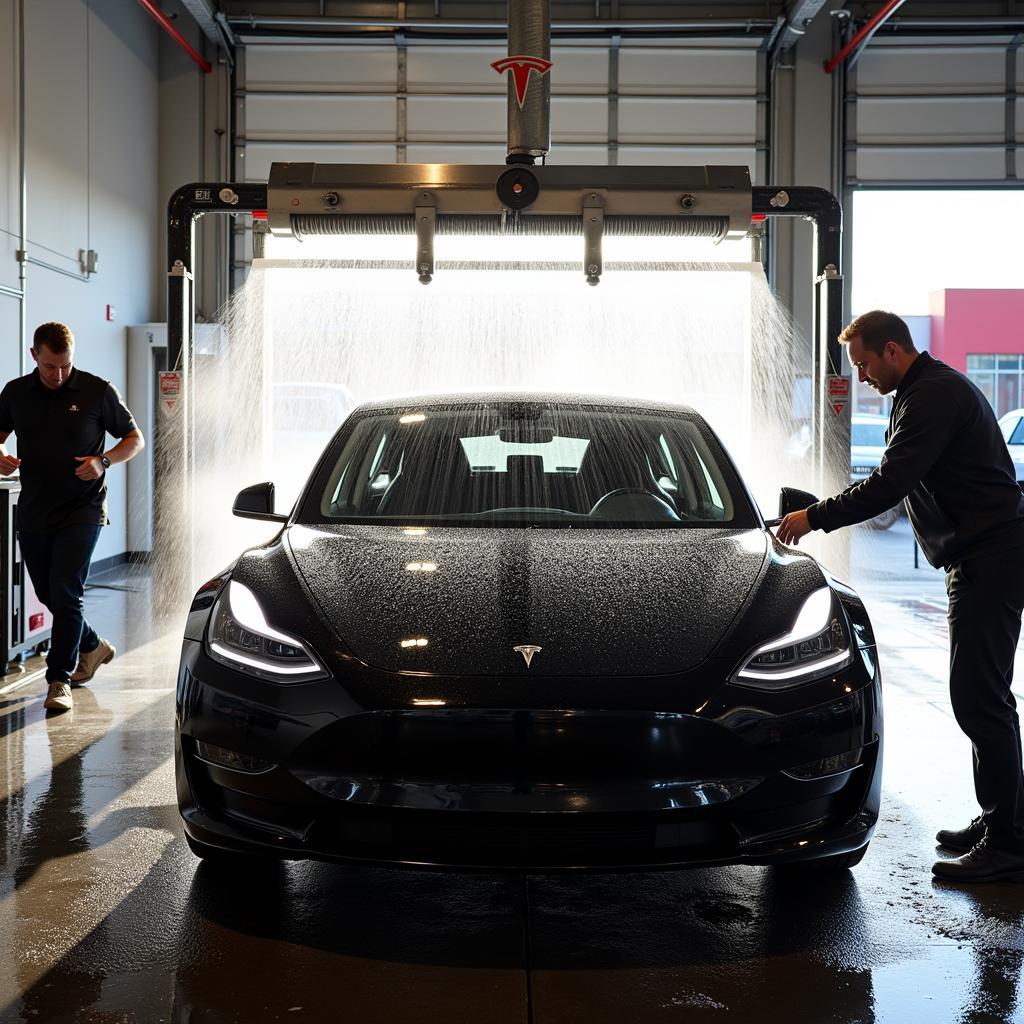What Does a Full Service on a Car Include?
For many car owners, a “full service” can seem like a mystical phrase uttered by mechanics in a language they don’t quite understand. However, understanding what a full car service entails is crucial for the longevity and performance of your vehicle. It’s not just an oil change and a quick look under the hood – it’s a comprehensive assessment of your car’s health.
This guide breaks down the essential components of a full car service, empowering you to make informed decisions about your vehicle’s maintenance.
Key Areas Covered in a Full Car Service
A full car service dives deep into the vital systems of your vehicle. Here’s a closer look at what you can expect:
Engine Oil and Filter Change: The Heart of Maintenance
Just like your body needs fresh blood, your engine relies on clean oil to function smoothly. A full service always includes:
- Draining and replacing the engine oil: This removes contaminants and ensures proper lubrication for all moving parts.
- Replacing the oil filter: This traps dirt and debris, preventing them from circulating back into the fresh oil.
Expert Insight: “Regular oil changes are non-negotiable. Skipping them is like running a marathon without water – it might seem fine at first, but the damage can be costly in the long run,” says Michael Carter, Senior Automotive Engineer at CarCare Central.
Fluid Level Checks and Top-Ups: Keeping Things Flowing
Your car relies on various fluids to function correctly. A full service includes checking and topping up these essential fluids:
- Coolant: Prevents overheating by regulating engine temperature.
- Brake fluid: Ensures optimal braking performance.
- Power steering fluid: Keeps steering smooth and responsive.
- Windshield washer fluid: Essential for clear visibility in all weather conditions.
- Transmission fluid: Lubricates and cools the transmission system (automatic transmissions).
Tire Inspection and Pressure Adjustment: Putting Safety First
Your tires are your only point of contact with the road, making their condition paramount for safety. A full service includes:
- Visual inspection: Checking for wear and tear, cuts, bulges, or any other damage.
- Tread depth measurement: Ensuring adequate tread depth for optimal grip and braking.
- Pressure adjustment: Inflating or deflating tires to the manufacturer’s recommended pressure for optimal performance and fuel efficiency.
Brake Inspection: Stopping Power You Can Trust
Your brakes are critical for safe driving. A full service includes a thorough inspection of your entire braking system:
- Brake pads and discs/drums: Checking for wear and tear and measuring thickness to ensure optimal stopping power.
- Brake lines and hoses: Inspecting for leaks, cracks, or damage.
- Brake fluid test: Assessing the condition of the brake fluid and checking for contamination.
Battery Assessment: The Pulse of Your Car
A reliable battery is essential for starting your car and powering electrical components. A full service includes:
- Visual inspection: Checking for corrosion, cracks, or damage to the battery casing.
- Testing the battery’s voltage and charging capacity: Ensuring the battery is holding a charge and can deliver sufficient power.
Lights and Electrical Components: Seeing and Being Seen
Properly functioning lights are crucial for visibility and safety. A full service includes:
- Checking all exterior lights: Headlights, taillights, brake lights, turn signals, and hazard lights.
- Inspecting interior lights: Dome light, map lights, dashboard lights.
- Testing the horn: Ensuring it produces a clear and audible sound.
Filters: Keeping it Clean
Filters protect your engine and cabin from harmful contaminants. A full service includes:
- Air filter replacement: Ensures clean air flow to the engine for optimal performance.
- Cabin air filter replacement: Keeps the air inside your car clean and free of dust, pollen, and other allergens.
Beyond the Basics: Additional Checks
In addition to the core components, a full car service often includes:
- Steering and suspension inspection: Checking for wear and tear in components like ball joints, tie rod ends, and shock absorbers.
- Exhaust system inspection: Looking for leaks, rust, or damage that could affect performance or safety.
- Drive belt inspection: Checking for wear, cracks, or fraying.
- Diagnostic scan: Using a scan tool to check for any stored error codes in the car’s computer system.
Why Choose a Full Car Service?
Investing in a full car service offers numerous benefits:
- Increased Safety: Ensures your vehicle is safe to drive by addressing potential issues before they become hazards.
- Enhanced Performance: Keeps your car running smoothly and efficiently, maximizing fuel economy and performance.
- Extended Lifespan: Regular maintenance helps prevent major problems, potentially extending the life of your vehicle.
- Higher Resale Value: A well-maintained car with a complete service history commands a higher resale value.
- Peace of Mind: Knowing your car is in top condition gives you peace of mind on the road.
Conclusion
A full car service is an investment in the longevity, performance, and safety of your vehicle. By understanding what’s included in this comprehensive check-up, you can make informed decisions about your car’s maintenance and enjoy worry-free driving for years to come. Remember, regular maintenance is always cheaper than a major repair down the road.
FAQs about Full Car Service
Here are some commonly asked questions:
- How often do I need a full car service? Most manufacturers recommend a full service annually or every 12,000 miles, whichever comes first.
- How long does a full service take? This depends on the make and model of your car and any additional repairs needed. Expect it to take a few hours.
- Can I do a full car service myself? While some tasks are DIY-friendly, a full service is best left to qualified mechanics with the proper tools and expertise.
- What is the difference between a full service and an interim service? An interim service is a less comprehensive check-up, typically recommended every 6,000 miles or six months.
- Where can I find a reputable mechanic for a full car service? Ask for recommendations from friends or family, or check online reviews for local mechanics.
For more information, check out our other helpful resources:
- How long does a service on car take
- What if my car does not have compete service history
- How to check hyundai car service history in india
Need assistance with your car service? Contact us via WhatsApp: +1(641)206-8880, or Email: [email protected]. Our dedicated customer support team is available 24/7 to assist you.

